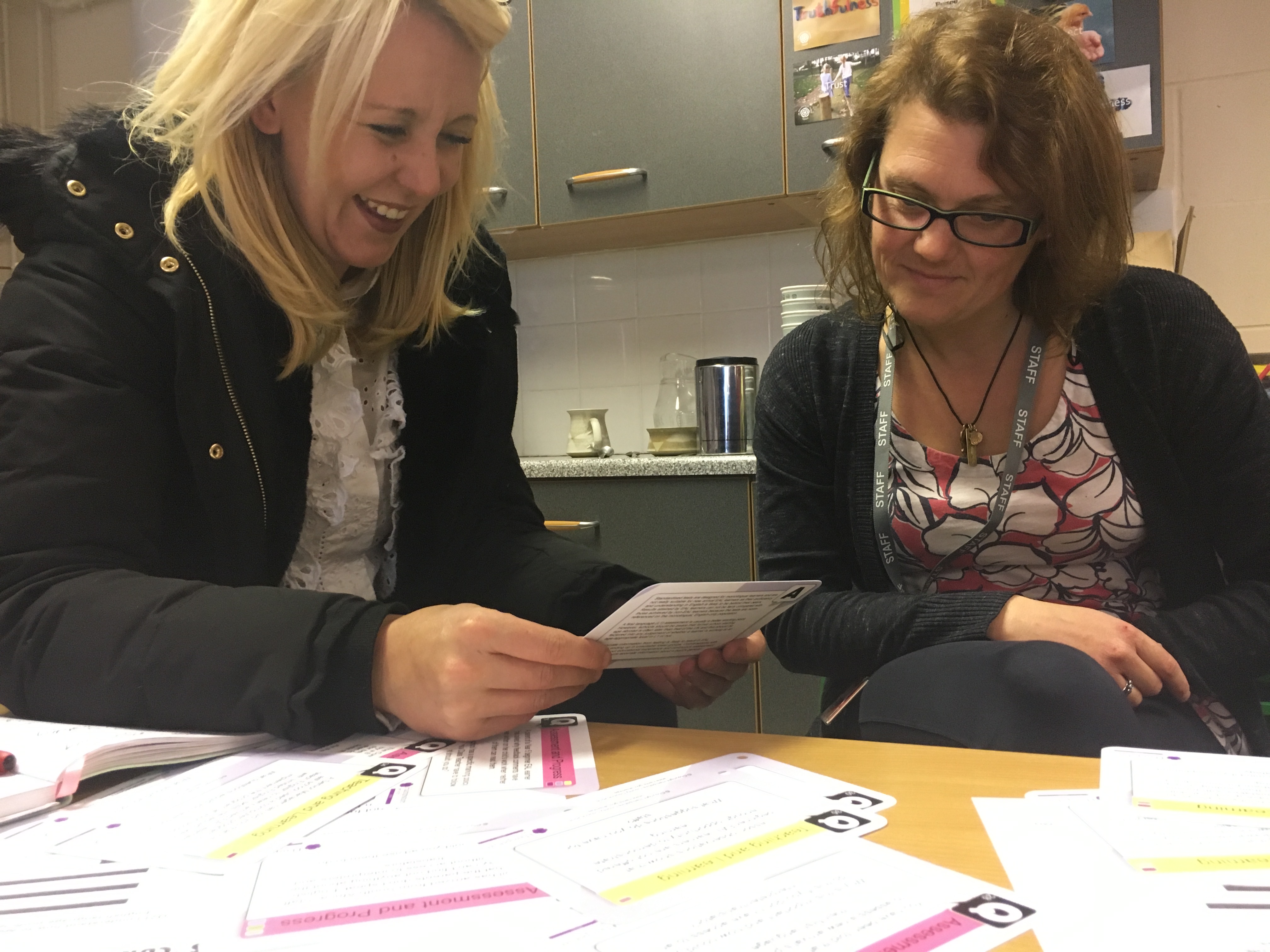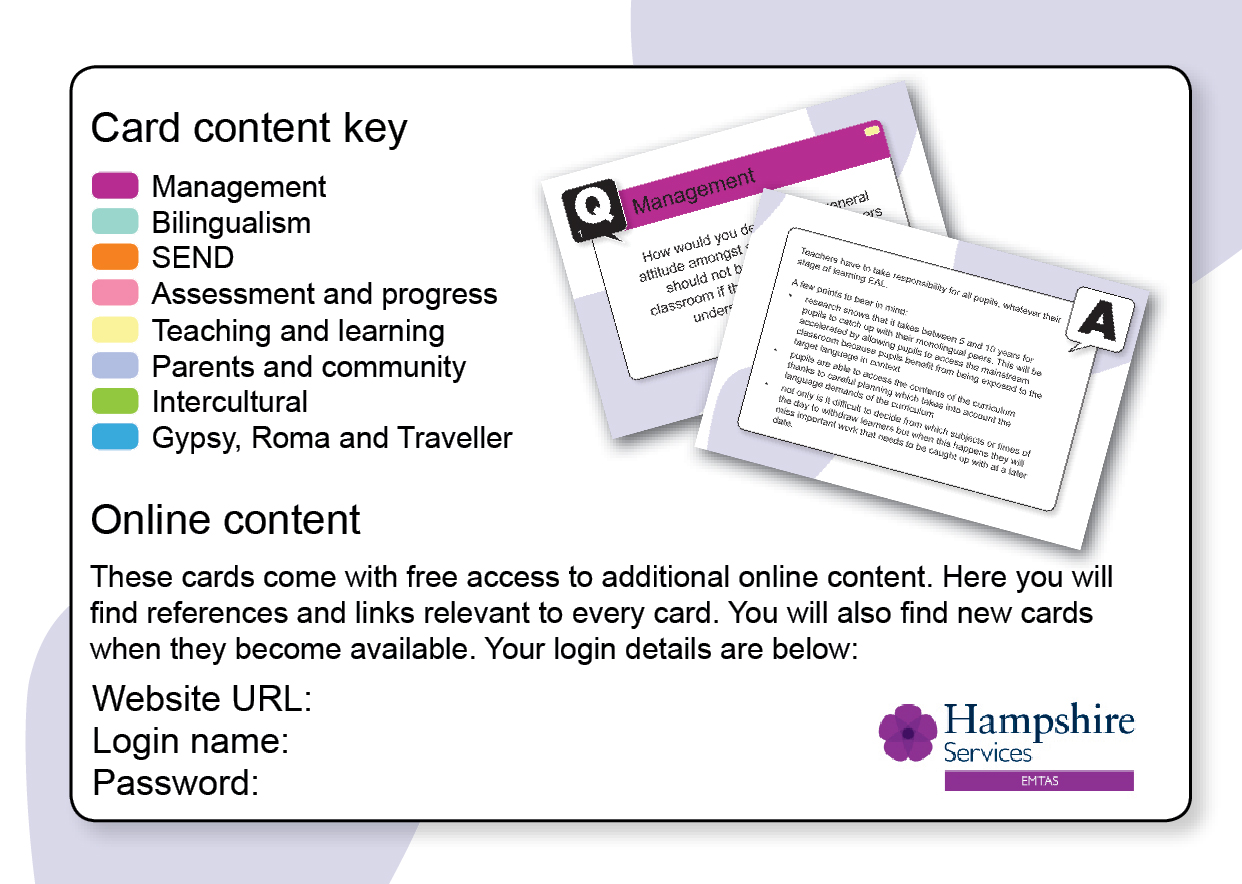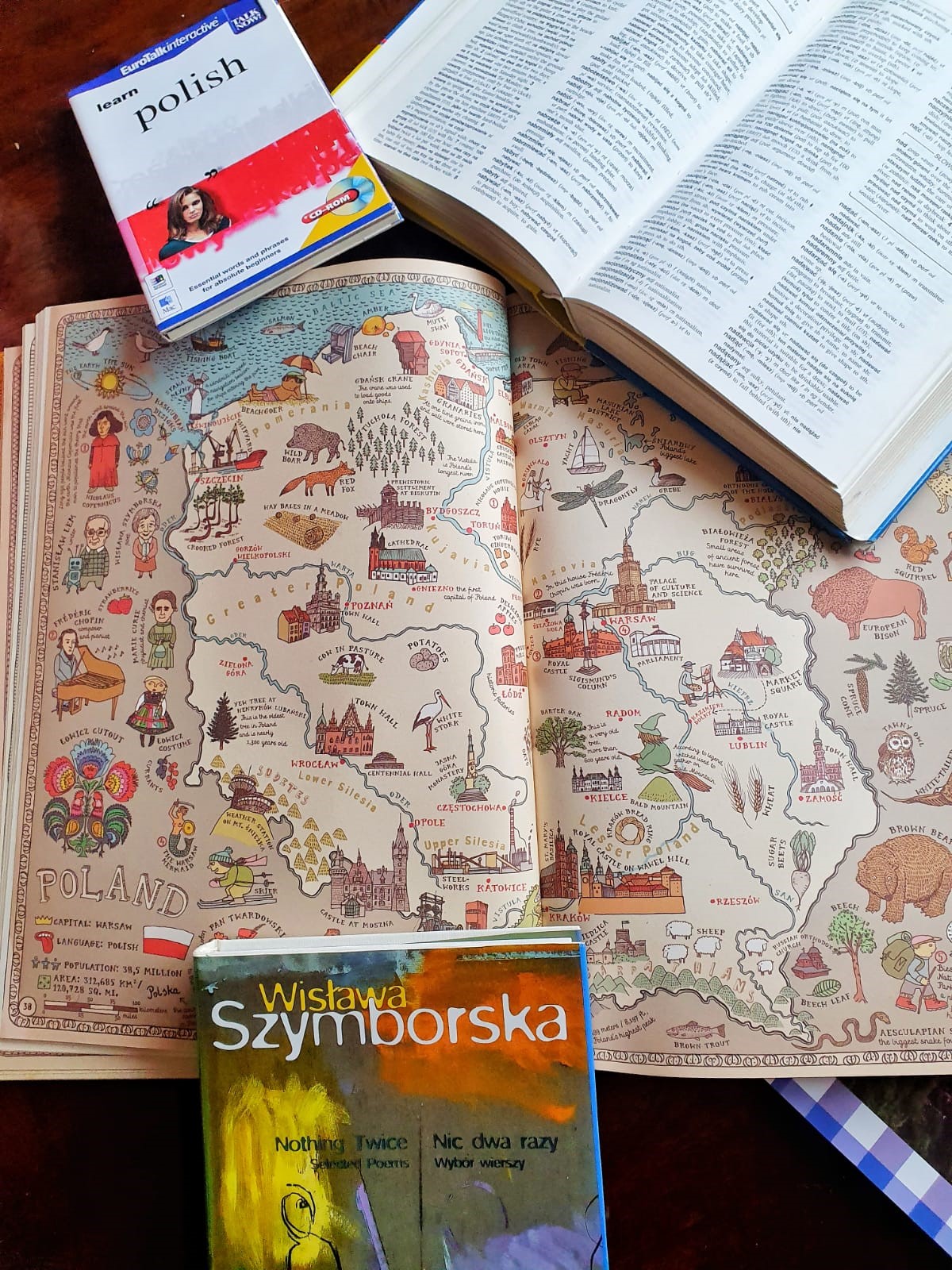Site blog
By Hampshire EMTAS Polish-speaking Bilingual Assistants Magdalena Raeburn and Katarzyna Tokarska.
Have you ever felt frustrated or out of your comfort zone because of communication barrier? Have you been on holiday abroad and found it tricky to explain what you need to your local shops, hotels or restaurants?
Imagine now, how much more complex and difficult a situation of an EAL child in a UK school might be. Try to put yourself in their shoes for a while… They come to the UK not for a holiday and not out of their own choice. They have to challenge themselves against a new language, new culture and a local community as well as the unknown school set of rules and regulations.
EMTAS Empathy Training will help you understand the complexity of the challenge that the EAL child faces every day. The aims of the session are:
- To increase awareness of the challenges that EAL learners face in the UK schools
- To give an insight into Polish learners’ cultural school differences
- To share ideas of how to approach the most common challenges experienced by the EAL learners.
During the training you will have a chance to become an EAL learner in a Polish classroom by taking part in a practical group activity on the geography of Poland. You will be expected to understand the teacher’s presentation, participate in a variety of activities, including group work, match the pictures, read and follow instructions as well as answer questions.
Would it be ‘only’ a language barrier…?
The training participants concluded that acquiring the language is only a part of the bigger picture. Cultural traits, local history, geography and customs are also a part of learning when they are trying to integrate into the new reality.
Our ‘students’ admitted that it ‘really made (them) consider other barriers than language’.
They also discovered that the manifested child’s behaviour in the classroom might have different roots rather than the ‘obvious’ ones… One of the participants said: ‘Very useful to understand how they would/could come across as ‘naughty’ or ‘distracted’’. It was an eye-opening experience.
Our workshop attendees revealed that their ‘survival’ strategy during the session was to answer ‘yes’ to any teacher’s attempt of communication. Have you got such EAL children in your classroom? Our workshop ‘students’ said it was their technique to use to be left alone rather than having to participate in the activity they do not feel competent or confident with. Our participants also felt ‘frustrated’, ‘confused’, ‘not very clever’ and ‘wanted to avoid being asked’. They were ‘easily disengaged’, ‘embarrassed when put on the spot’, ‘wanted to give up’ and ‘finally turned off’.
The session was an opportunity to face your own emotions as well as share the strategies, resources and ideas. Some strategies could involve researching information on the EAL child’s culture, educational system as well as taking your pupil’s personal experience into account.
When the EAL children join the UK classrooms, they need more than technicality of the language and pedagogical strategies. They need our empathy at every step of their challenging, new journey.
Take part in our empathy exercise at the Basingstoke EAL network meeting on January 28th. Limited spaces available and free to Hampshire maintained schools. For enquiries, please contact Lizzie Jenner, lizzie.jenner@hants.gov.uk.
Subscribe to our Blog Digest (select EMTAS).
In their last blog article published in the summer term, the Hampshire EMTAS team concluded the academic year with a celebration of their schools’ successful completion of the EAL Excellence Award. Now feeling refreshed after the summer break, the team look forward to the year ahead.
EAL Excellence Award
Our work supporting schools to develop and embed best practice for their EAL learners through the EAL Excellence Award continues. Surgeries will be held to help colleagues get ready for Bronze level and many of this year’s network meetings will focus on aspects of the award which practitioners need to develop for the next level up. For example, many schools will want to work on planning for the use of first language as a tool for learning this year (more on this in a future blog). See the EMTAS website for more information about the Award and how you can introduce it in your school or setting.
GRT Excellence Award
Following the success of the EAL Excellence Award, we have developed a similar award to support schools who have Gypsy, Roma and/or Traveller pupils on roll. At present, we have eight schools piloting the GRT Excellence Award and working towards getting their accreditation. To find out more, please contact: claire.barker@hants.gov.uk
NALDIC Berkshire & Hampshire Regional Interest Group (RIG)
NALDIC is the National Association for Language Development in the Curriculum and has an EAL remit. Part of the work of NALDIC is to run Regional Interest Groups (RIGs) across the country. Many of you may have heard that Dr Naomi Flynn is giving up her role as convenor of the Berkshire and Hampshire RIG. Whilst we are sad as this means we will see less of Naomi, we are also excited that the responsibility will now be shared between Portsmouth EMAS, Dr Anna Tsakalaki at the University of Reading and ourselves at Hampshire EMTAS! We wish Naomi all the best in her new role of Events Chair for NALDIC and look forward to working with our new co-convenors.
Network meetings
EMTAS network meetings are a great opportunity to meet colleagues with an interest in EAL practice and provision, to share ideas and to access input and take part in discussions on a range of EAL-related issues. These termly meetings are free to Hampshire maintained schools; staff from academies or the independent sector are also welcome to attend for a small charge. To find dates and information about how to register for a network meeting near you, see the Training section of the EMTAS website.
EAL E-learning
Our EAL E-learning has been given a complete overhaul this year to bring it up to date. The modules will now play even better in the Chrome browser and are optimised for seamless delivery over mobile devices. Check out our latest module on the ‘Role of the EAL coordinator’ and look out for new modules being developed this year.
SEAL (Supporting English as an Additional Language)
Due to popular demand, this course is running again starting in October 2019. It is a training programme for support staff and EAL co-ordinators to help them build up their knowledge of EAL good practice and pedagogy and has a strong focus on practical strategies to support pupils with EAL within their school environment. The course covers best practice in the classroom, SEND or EAL?, assessment, working with parents of children with EAL and the latest digital technology and resources to support learning in the classroom. If you are interested in signing up for this course, please check details on our website.
NALDIC Conference
This year the NALDIC conference takes place at King’s College London on 16th November (easy walking access from Waterloo station). The conference title this year is ‘Inclusive practices in multilingual classrooms: assessing and supporting EAL and SEND learners in the mainstream’. The NALDIC conference always has a good variety of workshops to suit all tastes, stands from publishers/resource providers and is a great place to network with colleagues from all over the country.
As you can see there are plenty of opportunities to get involved with EAL this year. We look forward to seeing you at an event near you.
Written by Hamish Chalmers, Doctoral Researcher at Oxford Brookes University


I run the NALDIC Oxfordshire Regional Interest Group (RIG) which is a forum for teachers, researchers and others interested in the education of EAL learners. Despite the very rich and diverse linguistic characteristic of Oxford and its surrounds, the Local Authority no longer has an EAL department and therefore no longer provides peripatetic support for EAL learners and their teachers. This means that it can be very difficult for individual teachers and schools to access training that would help them to keep up to date with developments in policy and practice relating to EAL, and ensure that they follow best principles in their teaching. Our RIG meets once a term. At each meeting teachers share their expertise, we invite guest speakers to talk about research and practice and we run workshops as a component of teachers’ continuing professional development.
We were delighted, therefore, to be given an opportunity to try out the Hampshire EMTAS EAL Conversation Cards with the RIG this autumn. The conversation cards are an excellent way to stimulate thoughtful discussion around provision for EAL learners in our schools. Each card poses a question related to a typical scenario. For example one cards asks ‘At your school, pupils who are relatively new to English are withdrawn from language classes for extra English. What would be your opinion of this policy?’ The question is designed to prompt discussion about this authentic scenario, with a view to the discussion helping teachers to understand their own practice and policy. Each question is then answered on the reverse of the card, providing evidence-informed guidance for teachers on how best to respond. For example, the answer to the question above reiterates the right of all children to have a broad and balanced curriculum. It then explains that EAL learners are often already competent language learners, so withdrawing them for classes that build on this foundation of skills to develop English is unlikely to be in their best interests. The card then goes on to suggest things that schools should take into account when setting related policy.
The cards are organised into eight themes, each addressing a different aspect of EAL education. These include management, teaching and learning, parents and community, bilingualism, and so on. Working with a group of 30 teachers, I divided the cards into sets that included examples from each section and asked small groups to appoint a questioner who would lead the discussion with two or three colleagues. The room was abuzz with discussion and debate as colleagues engaged with the cards and considered their responses. Eavesdropping on the conversations was fascinating as it revealed a great breadth of knowledge among colleagues, but also some very typical misunderstandings which allowed for some timely myth busting by the cards.
One colleague commented on how useful the cards were for schools like hers, which do not have an appointed EAL coordinator. Here, like many schools, EAL expertise is largely down to the experience of individual teachers. In the absence of teachers who have taught in schools with large numbers of EAL learners and with good ongoing professional development, knowledge and guidance is rather hit and miss. Because the conversation cards provide evidence informed guidance for real-world scenarios, it means that anyone can lead CPD sessions regardless of their level of experience. While this might not be the ideal situation, it does mean that teachers can be confident that they are getting good advice, especially in the light of the many myths about language learning that get reinforced when expertise is lacking.
Online content
We also looked at the online version of the cards. Here, the same information is presented but can be shared using a projector, so that discussions about the same question can be held in larger groups. Our RIG members were impressed that the online version provides links to other online content that expands and reinforces the messages provided in the answers.
Using the cards in training
Colleagues left the meeting inspired to continue their learning about EAL, and sharing this with their colleagues by using the Hampshire EMTAS EAL conversation cards. Many saw the potential for including short sessions in staff meetings, dealing with a couple of cards at a time, or for one to one personal professional development meetings. We were delighted to have been able to share this essential resource with our colleagues and hope that the cards continue to shape policy and pedagogy for Oxford’s vibrant and diverse language learners.
Where to get a set of cards
You can view a sample of the cards here where you can also find the order form.


